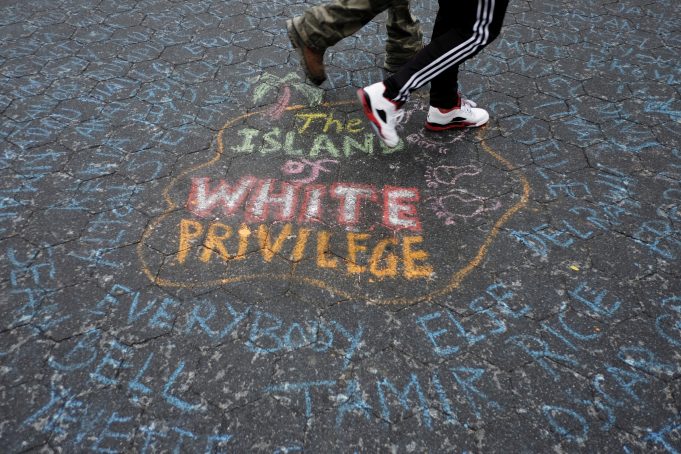WASHINGTON (Reuters) – “Black people do not hang themselves from trees.”
Weeks after a black man was found hanged in an Atlanta park, social media was rife with theories surrounding the circumstances of his death. Some people called it a lynching; authorities deemed it suicide.
“Black people don’t hang themselves from trees, given our history, if we gonna kill ourselves it’s gonna be quick!” Twitter user @taurusk_ posted on July 14.
Twitter and Instagram were deluged with posts like that one after the body was discovered. #Piedmont Park Hanging started trending online.
The body in Atlanta’s Piedmont Park was found the same week videos of police shootings of two black men in Louisiana and Minnesota went viral. The images of black men dying at the hands of law enforcement were quickly linked in online posts to the hanging. Users lamented what they saw as disregard for black lives.
Graphic videos of police shootings and arrests of black Americans in the past two years have triggered widespread protests, heightening tensions between police departments and African-Americans, who have long complained about excessive use of police force in their communities.
Against that backdrop, the internet’s hyper-speed blurring of fact and speculation surrounding such incidents may be adding to unease among African-Americans and contributing to the erosion of confidence in government, academic experts said.

When official conclusions are in question, theories passed around online can fill that vacuum. While the voracity of such stories sometimes can be difficult to assess, they can strike a chord with African-Americans, who in the past were the target of government sanctioned discrimination and abuse under Jim Crow laws and lynchings by culprits who went unpunished.
“It’s not a matter of black suspicion, this is a matter of history,” said Greg Carr, chair of the Afro-American studies department at Howard University in Washington, D.C.
In Atlanta, police reports said officers were called to Piedmont Park on July 7 after the body was discovered hanging from a white rope tied to a tree branch. The Fulton County Medical Examiner’s office concluded that it was suicide.
“The young man hung himself,” Clinton Harbin, an investigator with the medical examiner’s office, told Reuters.
But, spurred on by tweets from various accounts claiming that members of the Ku Klux Klan had been seen at the park before the hanging, some social media users have rejected these findings.
Atlanta Mayor Kasim Reed, who referred the case to the Federal Bureau of Investigation, told reporters at a July 8 press conference that the police department had found no evidence that the KKK was at the park, according to a story published by the Atlanta Journal-Constitution.
Social media helps such theories “spread like wildfire,” capitalizing on the uncertainty that often accompanies unfolding news events, said Travis Gosa, a Cornell University assistant professor who has written about hip-hop and conspiracy theories.
“If there is a downside to conspiracy theories in black communities, it’s that sometimes these stories only complicate and hinder the ability to develop trust between black Americans and societal institutions,” Gosa said.

After the shooting deaths of five police officers in Dallas and three in Baton Rouge, videos appeared on various Youtube feeds that alleged the attacks were part of a government conspiracy to discredit the Black Lives Matter movement, or to enforce more control over the public.
The videos got hundreds of thousands of views.
Paul Bromley, an education lawyer in New York, said his Facebook timeline lit up around that time with stories that said a black female police officer from Ohio was fired after she posted a fiery video online about racism in policing in the wake of the Alton Sterling shooting in Baton Rouge.
“Nobody thought to fact check that. Instead they just shared it and shared it. It was all over the place. It turned out to not be true,” Bromley said.
Theories and guesswork often intermingle on the internet with verifiable concerns about police conduct or investigations.
The death of Sandra Bland, a black woman found hanged in a Texas jail cell three days after she was taken into custody for a minor traffic infraction last year, sparked national outrage and questions about whether she should have been arrested at all.
After Bland’s death some people speculated online that officials had staged her mugshot after she was already dead, a theory debunked by video showing Bland alive during her three days in jail.
Credence for some of these theories may be derived from real events such as the Tuskegee syphilis study from 1932 to 1972, in which hundreds of black men in Alabama got “free” doctor visits, but were unknowingly denied medical care for syphilis so the disease’s progression in their bodies could be analyzed over time.
“Conspiracy theories become more believable once you have heard the story of Tuskegee,” said Anita Waters, a black studies and sociology professor at Denison University in Ohio, who has written on African-Americans and conspiracy theories.
In the case of the Atlanta hanging, members of the Southern Christian Leadership Conference asked state investigators late last month for more details about the death. Even if it is ultimately concluded that there was no foul play, the impact of such rumors may remain.
“I don’t think (rumors) have a lasting effect as … explanations of what happened,” Waters said. “But they may have a lasting effect in the mistrust that they foster in people.”




























